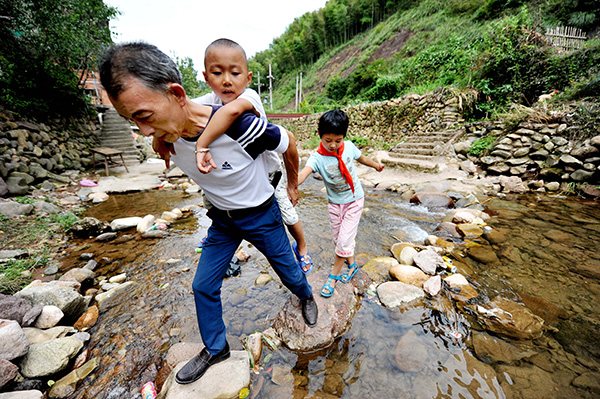
Two left-behind children follow their teacher to school in a mountainous area of Jiangxi province. (Zhuo Zhongwei/China Daily)
A series of news headlines recently has prompted soul-searching on the care for senior citizens and children.
A new draft law on the protection of minors in Zhejiang province, East China, says parents who have left their children at home to work in places hundreds, if not thousands, of kilometers away should contact their children at least once a month.
A 78-year-old woman in Sichuan province, Southwest China, recently took her four children to court for not visiting her regularly, and asked the court to pass a ruling to ensure the children do so. The court is yet to give its verdict.
And a nursing home for senior citizens in Suzhou, Jiangsu province, in East China, has announced a 200 yuan ($29) award for people who visit their parents at the home more than 30 times in two months. The home claims the number of visits has risen sharply since then.
Such news is heartbreaking. Do parents-children ties have to be sustained by law and monetary incentives?
Although laws and policies are being used to remind people to fulfill their filial duties and parental responsibilities as parents, it is difficult to enforce the law often due to the lack of plaintiff and corresponding punishment, and the effects of monetary awards may not last long.
The Sichuan case is perhaps the first of its kind, for few parents would want to embarrass their children by suing them for failing to fulfill their filial duties. Equally important, even if children can visit their parents in nursing homes everyday, parents would not like to trouble them so much.
There are two thorny issues-left-behind children and empty-nest senior citizens, who to some extent are the victims of China's rapid urbanization.
Each year, millions of people leave their hometowns to seek a better life in big cities. Among them are migrant workers who toil on construction sites and are thus reluctant to spend their meager wages on expensive high-speed railway tickets. Also part of this mobile population are young graduates harboring dreams of settling down in big cities who are not willing to regularly travel back home, for they can use that time to work and build their careers.
This explains the unique and largest human migration in the world during Spring Festival when more than 2 billion trips are made between cities and the vast rural areas across the country.
For many empty-nest elderly and left-behind children, this is the only time they can see their children and parents in one year, because after a short stay, they travel back to the cities.
The long distance between their hometown and place of work is very difficult to cover on a regular basis, but people can still strengthen their emotional bonds with their parents and children by calling them on the phone to enquire about their well-being at regular intervals. Besides, a video chat with young children back home, asking them to focus on their studies, is a good way to cheer them up and prevent them from going astray.
It is the thinking that someone cares for you and misses you all the time that offers the elderly and children the mental consolation they need.
Even among people who have already settled down in big cities and brought their parents to live with them, there is sometimes a lack of communication. Many people are very nice to and comfortable with friends, even strangers, but are often impatient when talking with their parents. A person's ugly side is at times on full display in front of people with whom they have the closest relationship.
It is time to reflect on how to take better care of people who have raised you and people who are your responsibility to raise.


















































